I want to use Angular's routing to monitor url changes to obtain different ejs templates, but express's routing will also react when the url changes. I would like to ask how to do it so that it does not enter express when the url changes to /phone. routing.
public/javascript/app.js
angular.module('ngApp',[])
.config(['$routeProvider',function($routeProvider) {
$routeProvider
.when('/', {templateUrl: 'pages/index',controller: 'PhoneListCtrl'})
.when(('/phone', {templateUrl: 'pages/phone-detail',controller: 'PhoneDetCtrl'}))
.otherwise({redirectTo: '/'})
}])
routes/index.js
var express = reqsuire('express');
var router = express.Router();
router.get('/pages/phone-detail', function(req, res, next) {
res.render("phone-detail", {title: '艾希'});
})
module.exports = router;
The picture below is the structure, and the templates are under view/pages

大家讲道理2017-05-15 17:00:10
Two questions
1. No matter how you think about it, angularjs and ejs feel repetitive. If you use angularjs, you can use html+ajax, and if you use ejs, you can use ejs+ajax. You don’t need to use both.
2. It is said that both are used. In the route setting of angularjs, the loaded page asynchronously loads the child page into the <ng-view> of the parent page, while ejs renders the entire browser window, which is equivalent to jumping the page. It does happen. conflict.
The solution I can think of for the time being is to use ejs to jump to the main page, and use ng-route to load the sub-pages asynchronously. However, the disadvantage is that otherwise cannot be set in the route settings of ejs and angular.